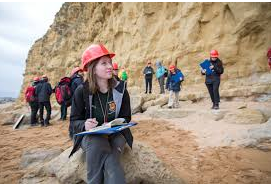Why is it Important to be Licensed to Practice Applied Geology?
If you are currently in college, taking courses and studying with the goal of becoming an Applied Geologist, your instructors may or may not be preparing you toward becoming licensed as a Professional Geologist (P.G.). Since licensure is not required for academia to teach geosciences, not all professors and faculty are familiar with the licensing requirements that you, as an Applied Geologist in a consulting, industry or governmental capacity, will need to attain.

Not every state in the United States requires a professional geology license to practice Applied Geology, but most do. Other countries may have different licensure requirements, or offer reciprocity; however, being licensed demonstrates competence in your field.
Most employers will expect or require their practicing geologists to be licensed for any positions beyond the most entry-level positions. Noting on your resume a licensure statement, even in states without geologic licensure, will place you well ahead of candidates that have not done so to your level. The order of preference of licensure is: highest, having attained P.G. licensure in any state; moderate, having passed the Fundamentals Exam for licensure, which may be used for taking the Practice Exam in most other states; and, lowest, having been accepted to take the next Fundamentals Exam.
Noting your licensure/certification status on your resume will give you a competitive edge when applying for a job. Most consulting firms consider licensure/certification an enhancement to your professional credentials and will want to include this information on resumes that are included in their competitive proposals.
Why is Professional Geologist licensure required?
Much of the work you will be tasked to do as an Applied Geologist affects the health, safety and welfare of the public and the environment. Your work also has enormous economic repercussions with regards to the feasibility of environmental & engineering geology projects. Work done, and recommendations made by, underqualified and inexperienced geoscientists can lead to cost overruns and public safety hazards. Some examples of the types of work you might be doing as an Applied Geologist that would necessitate rigorous standards:

- Ground water quality or quantity investigations;
- Bedrock and surficial sediment mapping used in the planning, design, construction and rehabilitation of buildings, dams, infrastructure and other physical structures;
- Geomorphological mapping of land subsidence and ground failure;
- Mapping, analysis, risk determination, and designing corrections of varied geologic and natural hazards (including but not limited to earthquakes, landslides, karst, stream bank and coastal erosion, wild fires, …) for land-use planning, public notification, and remediation;
- Testing, analysis, removal and/or remedial designs and actions, and monitoring of the fate, transport and remainder of environmental contaminants;
- Geophysical measurements used in various environmental or engineering investigations; and,
- Ground vibration analysis in association with earthquakes, blasting, structural demolition, and pile driving.
Which states require Professional Geologist licensure?
Thirty-one states and one US territory (Puerto Rico) now have registration, licensure, or certification laws: Alabama, Arizona, Arkansas, California, Delaware, Florida, Georgia, Idaho, Illinois, Indiana, Kansas, Kentucky, Louisiana, Maine, Minnesota, Mississippi, Missouri, Nebraska, New Hampshire, New York, North Carolina, Oregon, Pennsylvania, South Carolina, Tennessee, Texas, Utah, Virginia, Washington, Wisconsin, and Wyoming. Three states, Washington, Oregon, and California, offer specialty licenses to practice Engineering Geology. Washington and California also offer specialty licensure to practice Hydrogeology.
The National Association of State Boards of Geology (ASBOG)  oversees the standards and testing for Professional Geologist licensure. ASBOG does not actually license or register geologists, but they provide the examination materials that are required by ASBOG member states. A number of AEG members have contributed their expertise to improve the ASBOG examinations materials. To become licensed/registered, you must apply to the regulatory agency in the state in which you practice. A specialty licensure exam may be taken in those states where offered following licensure as a Geologist.
oversees the standards and testing for Professional Geologist licensure. ASBOG does not actually license or register geologists, but they provide the examination materials that are required by ASBOG member states. A number of AEG members have contributed their expertise to improve the ASBOG examinations materials. To become licensed/registered, you must apply to the regulatory agency in the state in which you practice. A specialty licensure exam may be taken in those states where offered following licensure as a Geologist.
What are the requirements to become registered as a Licensed Professional Geologist?
There are some variations from state to state, but generally you will need a four-year college degree in a geoscience-related field and at least four or five years’ geological work experience. (Your years spent teaching or earning advanced geology degrees can usually be counted towards professional experience.) You will also need to pass two examinations, the Fundamentals of Geology (FG) exam, and the Practice of Geology (PG) exam.
 Fundamentals of Geology is designed and intended as a first step to establishing a basic understanding of geologic processes and principles. The FG examination can be taken before completing all the professional work experience required for licensure. It is recommended that you take the FG examination during your final semester in college or shortly after graduating, while your curriculum is still fresh in your mind.
Fundamentals of Geology is designed and intended as a first step to establishing a basic understanding of geologic processes and principles. The FG examination can be taken before completing all the professional work experience required for licensure. It is recommended that you take the FG examination during your final semester in college or shortly after graduating, while your curriculum is still fresh in your mind.
Once you have passed the FG exam and completed your state’s required work experience, you can apply to take the Practice of Geology exam, which is the final step to becoming a licensed Professional Geologist.
Pass-fail analyses of the Fundamentals of Geology and Practice of Geology Examinations indicate that nearly 50 percent of the applicants who take the examinations fail upon their first attempt. Being unable to pass these exams indicates that the test-taker is unqualified to practice geology in a manner that would protect the health, safety, and welfare of the public, the environment and/or the economy. For these reasons, a standardized process of testing has been deemed necessary by most states.
How do I apply for licensing in my state?
To view the specific requirements for becoming licensed in your state and to apply to take an upcoming scheduled exam, visit the ASBOG state boards clickable map. (Do not contact ASBOG directly, please contact your state’s PG board.)
The exams are generally held twice per year (in fall and spring). Be aware of the application deadlines for your state, as you will have to wait another six months to take the test if you miss those deadlines. You may be required to provides references and other documentation to show your qualifications. Give yourself plenty of time to prepare for the exam. Practice exams are available through ASBOG.
For more information about becoming licensed and study tips for the Fundamentals of Geology exam, visit our Licensure Resources page.
Good luck, you’re on your way to an exciting career in Applied Geology!

I agree wholeheartedly, licensing is an indication of professionalism and career development. However, the profession as a whole is more interested in membership, not licensing. And why are so many geologists willing to provide professional recommendations to non-geologists seeking to get a license? Texas issued 6875 licenses during the grandfather period, and about 10\% of those were issued to individuals who did not meet the academic requirements, including many who had never had a college level geology course. This means that about 2000 geologists provided professional recommendations to otherwise unqualified individuals. What does it say about a profession when numerous members of that profession are willing to allow educationally unqualified individuals to practice that profession? I have never heard this issue addressed by any professional society and would be interested if the professional societies had any comment on this.